Interview: Poet M. Bartley Seigel on 'This is What They Say'
|
|||||||||||||||||
|
The scholar John Rodden calls the literary interview a “fully-fledged genre.” I used to be skeptical, but after assigning my students at The College of Saint Rose to speak with an author, I’m more inclined to think the literary interview qualifies as a distinct form of performance. I put out a call on Facebook and Twitter: Would you speak to a college student about your book? I asked. Sure, they said. Review copies were sent, students selected authors, read and researched their work, and asked questions. - Daniel Nester, Contributing Word Editor |
POET M. BARTLEY SEIGEL ON HIS COLLECTION OF POEMS, ‘THIS IS WHAT THEY SAY’ |
||||
INTERVIEWED BY
|
M. Bartley Seigel’s debut collection of poetry, This Is What They Say, just out through Typecast Publishing, is dedicated “to the people and places of Montcalm County, Michigan.” Seigel speaks of his hometown in an intensely personal way, revealing little snippets of time from his youth and surroundings. In prose poems to tell stories and recall memories, Seigel shows a unique place in time, leaving us recalling these moments as if they were our own. I spoke with the poet via e-mail about his teenage hangout spots, what there is to do in Michigan, what trinkets he collects, and what gets him inspired. JESSICA FURIANI: I wanted to ask you a few questions about your childhood and where you grew up if that’s okay, because some of the things you said hit close to home and since then this stuff has been floating around my head! Your collection This Is What They Say is dedicated to the people and places of Montcalm County, Michigan. Your collection shows a different side to what is referred to in your Typecast Publishing interview as a “first world wasteland.” You said you hated it as a kid and I relate to that. When you’re a kid, you feel trapped in the town you live in. When you get older, you learn to appreciate it. I went to visit my parents the other night and was sitting in my dad’s car waiting for him to pump gas at the gas station my friends and I always met up at. I was so bored then. Did you and your friends have a hangout like that? M. BARTLEY SEIGEL: There was a place in the town I grew up in called The Snack Shack. It was a little fast food place. It’s gone now, and there’s a McDonald’s. But at the time that was one of the places to gather. Then there was the cemetery where a lot of smoking, drinking, and hanging out was accomplished. And there was a place called the Peach Orchard out in the woods where bonfires and associated activities were held. FURIANI: You say it took you a while to “put the angst to bed” before writing poems about where you grew up. What about Montcalm County made you feel angst when you were living there? SEIGEL: Mostly, it’s just about being a teenager, I think. It’s about hormones and needing to get out from under your parents’ shadows and away from all of the people you’re forced into proximity with by virtue of being born in a place. I’m not entirely sure small-town kids have the market on teen angst locked up. Friends who grew up in both suburban and urban settings report similar experiences. But small towns have their own unique take on the theme. Everybody quite literally knows everybody else. While it may be easier to disappear into the landscape, there’s nowhere else to hide. FURIANI: What, if anything, made growing up in Montcalm County different from growing up somewhere else in the United States? SEIGEL: There are a lot of Montcalm counties all over the world. It’s a confluence of factors. Homogeneity. Industrialization. Poor education. Certain kinds of poverty. The list goes on. It’s just about the particulars and how they combine. What kind of poverty combined with what kind of industry? What kind of homogeneity combined with what kind of poor education? Montcalm County is unique in the way it puts those pieces of the puzzle together, but not particularly unique in that it either has pieces or that life is a puzzle. FURIANI: What was your high school experience like? What would a teenager in Montcalm County, Michigan find themselves doing for fun on a Saturday night? SEIGEL: In the late 80’s, early 90’s? Part Fast Times at Ridgemont High. Part Winter’s Bone. We drank a lot. We sat around a lot of bonfires. There were fights and girls and looking for anything that resembled a novelty or a thrill. Some friends and I used to steal a lawn chair off someone’s lawn, find a particularly desolate stretch of back road, set the chair in the middle of the road with a piece of fishing line tied to it, then we’d hide in the bushes or in the corn. Someone would come along, get out of their car to either move the chair or take it, and we’d pull the string, making the chair and the victim jump high into the air. A guy pulled a knife one time, cussing and stamping, cut the line, and took the chair while my friends and I ran into the woods screaming. FURIANI: Your high school years sound a lot like mine! You’ve gotta find something to distract yourself in a small town. You’re definitely right about the hormones. We’re all itching like mad to get our lives going. It’s torture to just watch the clock so slowly. I definitely did my fair share of drinking and smoking around bonfires. When in doubt, go into the woods, right? I always loved to write ever since I was a kid. As a kid, did you feel you could express yourself better on paper? Did you feel a sense of power in the way you were able to express yourself through words? SEIGEL: Language is power. If you control words, control the story, you control situation and the people in it. Language won’t get you out of every scrap, but it will get you out of many. Look at the current election cycle and the money spent on ads. That’s about language and control if nothing else is. Think of the money that goes into that! FURIANI: This Is What They Say was published by Typecast Publishing, based in Louisville, Kentucky. How did you get involved with them? FURIANI: Typecast’s website says that your book is “entirely made by human hands, letter pressed and designed by The Firecracker Press,” and they are based in St. Louis, Missouri. How did you get linked up with Firecracker Press? Did Typecast refer you to them? SEIGEL: Firecracker is run by Eric Woods, Jen Woods’ brother, so that collaboration was there from the beginning. Firecracker does all of Typecast’s books, or has thus far. But it was one of the reasons I was interested in Typecast to begin with. That artisanal thing they do with books is really important to me. Books are sacred objects, not industrial commodities. FURIANI: I agree with you. In another one of my classes, we just talked about the disappearance of books and it made me sad. I don’t think it will ever happen, though. There’s something about a nice, worn book that a Kindle can’t give you. Was it a conscious choice to have your book be handmade? Do you have an interest in sustainability? SEIGEL: It was. I write about people whose hands are dirty. I wanted my book object to reflect that. And yes, I am interested in sustainability, especially local economies and skilled trades. FURIANI: Who do you find your audience is? Younger folks? Older folks? A mixture? SEIGEL: I’m an odd mix. PANK skews my audience younger than I think I merit and I get lumped in with a kind of alt-lit cadre that I’m not entirely sure I fit neatly into. I’m almost 40. Likewise, at the older, more pedigreed end of the spectrum, where I’m being read at all, I get the feeling I’m not being entirely trusted (maybe just paranoia on my part), like I’m an odd interloper of some kind. FURIANI: You moved to Houghton, Michigan, which I just found out was rated one of the 100 Best Small Towns in America. SEIGEL: Houghton is an end-of-the-road kind of place. There’s no real way to pass through here. Let’s call it quirky. Gorgeous country, woods, Lake Superior, 19th century sandstone architecture, lots of mining ruins. It’s very ghostly in some ways. I live in East Houghton, in a house with a yard, between the old downtown and Michigan Technological University’s campus. I like to mountain bike (we have some of the best in the world, believe it or not), swim, camp. We just had a little film festival where my favorite offering was Beasts of the Southern Wild. There’s good skiing in the winter. Food isn’t particularly fantastic up here. There’s good pizza, meat-and-potatoes kinds of places, some mediocre Chinese that gets better if you can get them to let you order off the part of the menu they only write in Chinese, and a nice little microbrewery/tap house. We’ve got a pretty kick-ass co-op, too. If you want to drink, Houghton will provide. It’s something of an Olympic-class sport here. We’re very proud drinkers. FURIANI: You live with your wife Marika and kids Annika and Indrek. I was wondering if you could tell me about the origin of their names because they are very beautiful and interesting. SEIGEL: My wife’s family is Estonian on her mother’s side. Annika is a popular Scandanavian name. Indrek (Ints for short) is a very common Estonian name. We travel to Estonia quite a bit. There’s still a lot of family there. Both kids have dual citizenship. FURIANI: You are the founding editor of literary magazine PANK along with Roxane Gay. How did you meet her? How has PANK changed since its birth in 2006? SEIGEL: I started the magazine in 2006 when I first got a job at Michigan Tech. Roxane was a graduate student there at the time, studying for a PhD in rhetoric. We met, both had an interest in the magazine, and the rest is the rest. Stars aligning, really. We’re an odd couple in many, many ways, but whatever it is that we both bring to the project (besides ridiculous amounts of work) has been magic. SEIGEL: I’m writing about 90% of my workday. I’m writing now. I’m writing emails, texts, I journal and jot, doodle, and scribble. I make a lot of lists. And I read, constantly, voraciously, obsessively. I write “seriously” in intense bouts, a day here, a day there, until production adds up to something I can develop and revise. But I tend to think of process radically, that my entire life is part of my artistic process. Food is art. Parenting is art. Sex and travel and doing the dishes and walking the dog, all art. It all feeds in. Presence and mindfulness are important concepts for me. No matter where I go, there I am, no less so as a writer than as anything else. FURIANI: I have all kinds of rocks and dead flowers and butterfly wings and things from my past that I like to put on my dresser where I can see them. I like to be surrounded by it. Do you collect any little trinkets for inspiration? SEIGEL: “Cabinets of curiosity,” the Victorians called them. Yes, I have different kinds of totems. Natural things. Sticks. Stones. Feathers. Artifacts. I like face jugs. Old glass bottles. Matryoshka dolls. Little Buddha figures. FURIANI: Who are some of your favorite poets of all time? SEIGEL: Walt Whitman, Gertrude Stein, Alan Ginsberg, Charles Bukowski, Anis Mojgani, just to name a few through time. |
||||
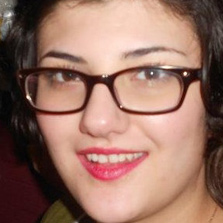 |
|||||
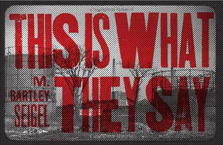 |
|||||
| Visit M. Bartley Seigel… | |||||










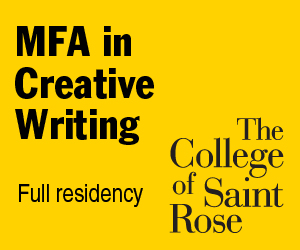
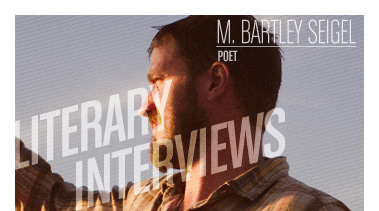
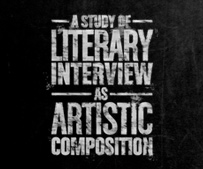














 Stated
Stated
Reader Comments